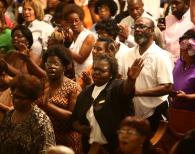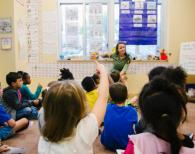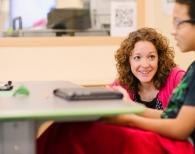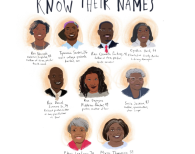As the community of Charleston, SC continues to reel from a horrific hate crime, we feel it is important to take time to honor and remember those who lost their lives at “Mother Emmanuel” AME Church one week ago. Below are the names and a brief description of each of the nine church members killed by a 21-year-old white supremacist last Wednesday. Click here to see further messages of support and to leave your own.
Blog

June 19, 2015 - 5:57pm
On June 17, nine people lost their lives at a Bible study inside Charleston, SC’s historic "Mother Emanuel" AME Church, at the hands of a 21-year-old man, poisoned by racism and hate. People grieving and filled with outrage are asking: What can we do? The most effective way to respond to the hate attack in Charleston is to take action locally. Over the last 20 years, Not In Our Town, a movement of people across the country working to stop hate and bullying, has learned one indisputable thing: The solutions to hate violence and bigotry require each of us to participate.
Here are three ways you can take immediate action and stand up to hate

June 18, 2015 - 2:22pm
One moment, people were praying in the historic Emanuel African Methodist Episcopal Church in Charleston, SC, and the next, nine people were shot to death. Our hearts reach out to the friends and families of Rev. Sharonda Coleman-Singleton (45), Tywanza Sanders (26), Cynthia Hurd (54), Rev. Daniel Simmons Sr. (74), Rev. Depayne Middleton (49), Susie Jackson (87), Ethel Lee Lance (70), Myra Thompson (59) and Rev. Clementa C. Pinckney (41), church pastor as well as South Carolina State Senator.

June 10, 2015 - 9:09am
The final domain of identity safety is caring classroom environments, where social skills are taught and practiced to help students care for one another in the context of an emotionally and physically safe classroom.

June 3, 2015 - 9:09am
Positive classroom relationships are the foundation of an identity safe classroom. You cannot create a sense of identity safety without a continuous focus on how the students are feeling and treating one another. Positive classroom relationships are based on trusting, positive interactions with the teacher and among the students.
